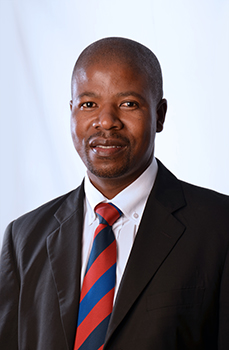
Henry Dumisani Madlala
William Arthur Ward once said: “The mediocre teacher tells. The good teacher explains. The superior teacher demonstrates. The great teacher inspires.”
However, a teacher can only be great and inspire when teaching is a passion and a calling.
This is exactly the case with Henry Dumisani Madlala, Councillor of the University of the Free State. Mr Madlala is the principal of New Horizon College, a private school in Harrismith.
High educational standards and quality teaching
“New Horizon College is an independent, non-racial educational institution striving to maintain high educational standards and making quality education accessible to all. We have attained a 100% matric pass rate each year in the past six years since I became headmaster."
"My recipe is simple: teachers must teach and learners must learn.”
Mr Madlala was born and bred in KwaZulu-Natal and matriculated from Amazulu High School. Afterwards, he completed a BSc degree in Mathematics and Physics at the University of the North’s Qwaqwa Campus.
Delegate, govern, and trust
He says: “There are three key management principles which I follow as principal: delegate, govern, and trust. I give responsibilities to people, I make sure that they know what is expected of them, and in the end I trust them to carry out their responsibilities.”
His career as teacher and principal has been full of highlights on which he looks back with satisfaction.
Proud to plough back into the university
Madlala has been serving on the UFS Council since 2010 and has been part of Kovsie Alumni’s executive management since 2011. He is proud to plough back into the university in this manner.
“To me, being a Kovsie alumnus means pride, respect, discipline, and loyalty. Once a Kovsie, always a Kovsie!”
For this reason, Madlala believes that the UFS will play a major role in the country and in higher education for a long time to come.
“The UFS has been in existence for more than a hundred years and will no doubt survive for another hundred years or longer. We are indeed one of the leading universities in the country when it comes to transformation and academic excellence. The survival of the UFS is not a dream, but a reality.”